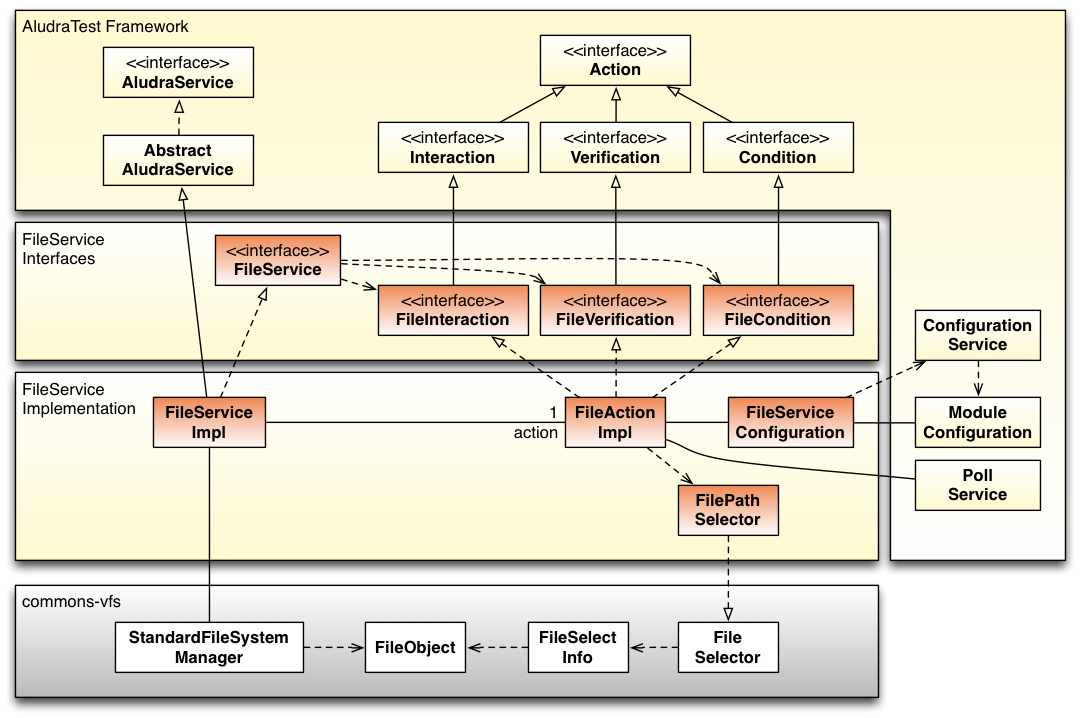FileService Developer Guide
This document describes the internal mechanisms used in the implementation of the AludraTest FileService. Its intended audience is the maintainers and extenders of the AludraTest Framework.
Class Diagram

Interfaces
The FileService follows the AludraService conventions defining an Interface FileService with methods that provide file-related action interfaces:
- perform(): FileInteraction
- verify(): FileVerification
- check(): FileCondition
Implementation
The FileService implementation resides in package org.aludratest.service.file.impl. It uses the Commons VFS API and its implementations to access different types of file systems in a uniform manner while completely hiding the Common VFS classes from the user. Thus, commons-vfs may be exchanged with another library without any affect on the test code that invokes the FileService.
FileServiceImpl
The class FileServiceImpl implements the FileService interface.
Since the feature set is not too big, a single class was designed to implement all three action interfaces: FileActionImpl. The FileServiceImpl holds only a single instance of the FileActionImpl and returns this from any call to perform(), verify() and check().
FileServiceImpl creates a FileServiceConfiguration and hands it over to the FileActionImpl. When closing the service, also the configuration must be closed, since it manages the Commons VFS resources.
FileServiceConfiguration
The FileServiceConfiguration object is created using the FileService Preferences (passed by the framework via the Configurable interface). After that, it queries all configuration properties to assure the configuration is complete.
Commons VFS
Commons VFS API
Core classes of Commons VFS are the StandardFileSystemManager and the class FileObject. The first one provides access to a file system and the latter one represents an element in a file system: a file or a directory.
Commons VFS is able to support arbitrary file systems by a plugin mechanism which is configured in an XML file, META-INF/vfs-providers.xml, and evaluated by the StandardFileSystemManager.
Plugging in File System Types
The VFS configuration file META-INF/vfs-providers.xml resides in AludraTest's folder src/main/resources. The current configuration is:
<?xml version="1.0" encoding="UTF-8" > <providers> <provider class-name="org.apache.commons.vfs2.provider.ftp.FtpFileProvider" /> <provider class-name="org.apache.commons.vfs2.provider.sftp.SftpFileProvider" /> <provider class-name="org.apache.commons.vfs2.provider.http.HttpFileProvider" /> <provider class-name="org.apache.commons.vfs2.provider.https.HttpsFileProvider" /> </providers>
If support for further file systems is desired in the future, this is the place to start.
VFS integration into FileService
Commons VFS' StandardFileSystemManager is wrapped by FileService's class FileServiceConfig. It is responsible for creating and closing it.
Note that closing a network connection (e.g. FTP) happens when the related FileSystemManager is close()d.
FileObject Abstraction
In Commons VFS, each file system item is represented by a FileObject. AludraTest's FileService uses a path string (relative from the file system's base directory) to represent a file.
Mapping a file path to a FileObject happens in FileServiceConfiguration's getFileObject() method, the opposite transformation in pathFromRoot().
Special adapter classes
For copy operations, VFS requires a FileSelector implementation to select the files to be copied. FileService provides a FilePathSelector to include only a single file by its path.
There exists an enumeration class Linefeed with to instances, WINDOWS and UNIX (providing the linefeeds \r\n and \n) which are used to simplify configuration file parsing.
